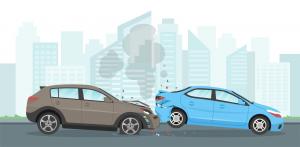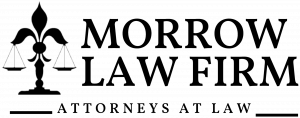Understanding Liability for Personal Items Damaged in Louisiana Car Accidents
Personal items are often overlooked when assessing damages after an accident.”
OPELOUSAS, LA, UNITED STATES, December 20, 2024 /EINPresswire.com/ -- Car accidents can result in more than vehicle damage and personal injuries. In many cases, valuable personal items inside the vehicle—such as electronics, jewelry, or luggage—are also damaged or destroyed during the collision. Determining liability for these items and understanding how compensation is handled under Louisiana law can help individuals recover their losses.— William P. Morrow
William P. Morrow, a lawyer at Morrow Law Firm in Opelousas, Louisiana, explains the complexity of liability for personal property in car accidents. “Personal items are often overlooked when assessing damages after an accident. Louisiana law provides pathways for recovery, but individuals need to understand who may be liable and how these claims are evaluated.”
Defining Personal Property Damage
When a car accident occurs, the term “property damage” typically applies to the vehicle itself. However, personal property, such as smartphones, laptops, prescription glasses, clothing, or tools stored in the car, can also be damaged. These items are considered part of the total loss and can be included in claims for compensation.
Property damage claims are separate from personal injury claims but may arise from the same accident. Liability for damaged personal property depends on several factors, including fault, insurance coverage, and the specific circumstances of the collision.
Determining Liability for Damaged Personal Property
Louisiana operates under a comparative fault system, meaning liability is assigned based on the degree of fault each party holds for the accident. If another driver is found responsible for the collision, their insurance may cover both vehicle repairs and the cost to replace or repair damaged personal property.
The At-Fault Driver’s Insurance
The at-fault driver’s liability insurance policy often includes coverage for property damage. If the other party caused the accident, their insurance company is typically responsible for compensating personal property losses up to the policy limits.
Personal Insurance Coverage
If the at-fault driver’s insurance does not cover the full cost of personal property damage, or if the other driver is uninsured, individuals may file a claim under their own policy. Comprehensive or collision coverage can sometimes extend to personal property, depending on the policy terms.
Shared Fault
Under Louisiana’s comparative fault rule, compensation for personal property may be reduced if the individual is partially responsible for the accident. For example, if a person is found to be 20% at fault, the compensation for damaged items may be reduced by 20%.
Negligence of Third Parties
In some cases, third-party liability may apply. For example, if poorly maintained roads or defective vehicle parts contributed to the accident, government agencies or manufacturers may bear partial responsibility for damages, including personal property loss.
Documenting Damaged Personal Property
Proper documentation is crucial when seeking compensation for damaged personal items. Evidence strengthens the claim and ensures accurate valuation.
Important steps include:
Photographic Evidence: Take clear photos of damaged items immediately after the accident. Include multiple angles to show the extent of the damage.
Receipts and Proof of Value: Maintain receipts, invoices, or appraisals for valuable items. These documents help establish the original value of the property.
Police Reports: Request a copy of the accident report, as it serves as official documentation of the collision and its details.
Witness Statements: Statements from witnesses can support claims regarding fault and the presence of personal property at the scene.
Accurate documentation ensures that insurance adjusters have the necessary information to assess claims fairly. Without proof of ownership or value, insurance companies may dispute or undervalue personal property damage.
Limitations and Challenges in Personal Property Claims
While personal property damage is recoverable, certain challenges may arise during the claims process:
Insurance Policy Limits: Liability coverage has limits, and personal property claims may be denied or partially paid if damages exceed these limits.
Depreciation: Insurance companies often factor in depreciation when determining the value of damaged property. This means older items may be compensated at a reduced rate compared to their original cost.
Exclusions in Coverage: Some insurance policies exclude specific types of personal property, such as cash, collectibles, or specialized tools. Policyholders should review their coverage to understand any limitations.
Recovering Compensation for Damaged Personal Property
When pursuing compensation, individuals may choose to negotiate directly with insurance adjusters or seek legal assistance to ensure a fair outcome. Legal representation can help address disputes over liability, policy limits, or undervaluation of property.
In cases where the at-fault driver’s insurance is insufficient or non-existent, uninsured/underinsured motorist coverage can provide an alternative avenue for recovery. Filing claims promptly and providing thorough documentation are key to achieving a successful resolution.
Louisiana’s Legal Framework for Property Damage Claims
Under Louisiana law, the statute of limitations for property damage claims arising from car accidents is one to two years from The date of accident depending on when the accident occurred. Missing this deadline may forfeit the right to pursue compensation.
Additionally, Louisiana’s comparative fault rule ensures that damages are allocated fairly based on each party’s level of responsibility. Understanding these legal principles can help individuals navigate the claims process effectively.
Conclusion
Personal property damage resulting from car accidents is often overshadowed by vehicle repairs and personal injury claims, but it remains a significant financial and emotional loss. Louisiana law provides pathways for recovering compensation, but individuals must understand how liability is determined, how insurance coverage applies, and the importance of proper documentation.
Morgan Thomas
Rhino Digital, LLC
+1 504-875-5036
email us here
Visit us on social media:
Facebook
Legal Disclaimer:
EIN Presswire provides this news content "as is" without warranty of any kind. We do not accept any responsibility or liability for the accuracy, content, images, videos, licenses, completeness, legality, or reliability of the information contained in this article. If you have any complaints or copyright issues related to this article, kindly contact the author above.


